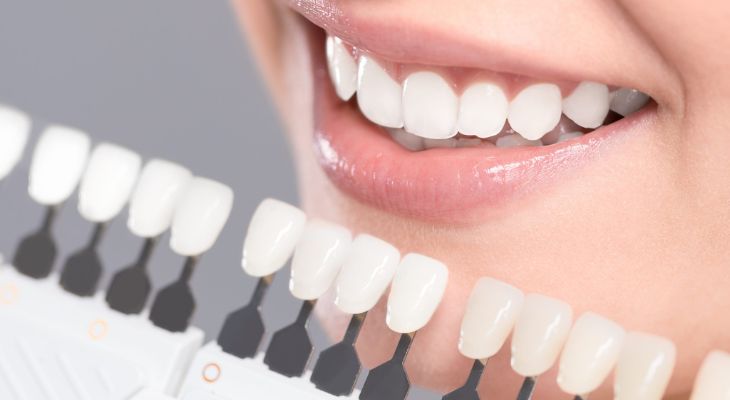
Smile Makeover: Different Types of Veneers
Smile makeovers are becoming increasingly popular, and it’s easy to see why. These procedures can transform your smile, making it look as dazzling as those of celebrities and influencers.
Whether you’re looking for minor changes or a full-mouth transformation, veneers are crucial in achieving those stunning results. If you’re considering a smile makeover, choosing the right type of veneer to align with your dental needs is important. Additionally, selecting a reputable dentist and clinic specializing in smile makeovers is essential for optimal results.
Let’s explore the different types of veneers to help you make an informed decision:
Porcelain Veneers
What They Are: Porcelain veneers are crafted from high-quality ceramic material that closely mimics the appearance of natural teeth. These veneers are custom-designed to fit your teeth perfectly, offering durability and aesthetic appeal.
Advantages:
-
Natural Appearance: Porcelain veneers have a translucent quality that closely resembles the natural enamel of your teeth, making them almost unnoticeable from your natural teeth.
-
Durability: They are incredibly strong and can last several years with proper care, making them a long-lasting option.
-
Stain Resistance: Porcelain veneers resist stains better than composite veneers, maintaining their bright, white appearance over time, even with regular consumption of coffee, tea, or red wine.
Considerations:
-
Cost: Porcelain veneers are more expensive than other veneers due to their superior quality and longevity.
-
Preparation: The procedure requires some removal of the natural tooth structure to ensure a proper fit, which is irreversible.
Composite Resin Veneers
What They Are: Composite resin veneers are made from a tooth-colored resin applied directly to the teeth. The dentist designs the resin to achieve the desired shape and size, often completing the procedure in a single visit.
Advantages:
-
Cost-Effective: Composite veneers are generally less expensive than porcelain veneers, making them a more affordable option for many patients.
-
Reversible: Less tooth preparation is required than porcelain veneers, making them a more reversible option if you decide to remove them later.
-
Quick Application: The procedure can often be completed in just one visit, making it a convenient option for those with busy schedules.
Considerations:
-
Durability: Composite veneers are less durable than porcelain and are more prone to chipping and staining.
-
Lifespan: They typically last a few years before needing replacement, which is shorter than the life span of porcelain veneers.
No-Prep Veneers
What They Are: No-prep veneers, also known as minimal-prep veneers, are designed to be applied with little to no removal of the natural tooth structure. These veneers are often made from a thin layer of porcelain or resin.
Advantages:
-
Minimal Tooth Alteration: Since minimal to no tooth preparation is required, the natural tooth is less altered, preserving its originality.
-
Reversibility: These veneers are easier to remove and replace if necessary, offering flexibility for future dental needs.
-
Faster Procedure: The process is generally quicker since less preparation is needed, often allowing for a swift and efficient treatment.
Considerations:
-
Limited Coverage: No-prep veneers may not be suitable for addressing severe cosmetic issues or significant alignment problems.
-
Durability Concerns: While still durable, they may not be as strong as traditional porcelain veneers.
Lumineers
What They Are: Lumineers are a brand of ultra-thin veneers made from a special type of porcelain. They are similar to no-prep veneers but are designed to be even thinner and require minimal tooth alteration.
Advantages:
-
Ultra-Thin Design: Lumineers' thinness allows for minimal or no tooth reduction, preserving the natural tooth structure.
-
Reversible: Like no-prep veneers, Lumineers can be removed if needed, offering flexibility and peace of mind.
-
Natural Appearance: They provide a natural look and feel, enhancing the beauty of your smile without compromising the integrity of your teeth.
Considerations:
-
Suitability: Lumineers are not ideal for cases requiring significant adjustments to the tooth’s appearance or alignment.
-
Cost: Similar to traditional porcelain veneers, they can be expensive, but the long-term benefits often justify the investment.
Choosing the Right Veneer for You
When deciding on the best type of veneer for your teeth, consider factors such as the. Each type of veneer offers distinct advantages and potential drawbacks, so understanding these differences will help you make the best choice for achieving a beautiful, confident smile.
Schedule a consultation at Veda Dentistry for more information about a smile makeover in Delhi, and we will suggest a veneer that aligns with your needs and expectations.

